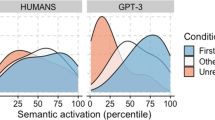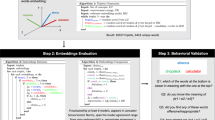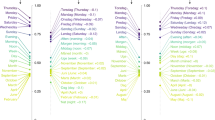Abstract
As any lexicographer knows, the meanings of words are not immediately open to introspection. Their covert nature underlies at least one current controversy: some theorists propose that meanings are composed of semantic primitives1, whereas others deny the existence of such entities2,3. We have investigated the matter in an evaluation of the responses of naive speakers as a source of lexicographical information.
This is a preview of subscription content, access via your institution
Access options
Subscribe to this journal
Receive 51 print issues and online access
$199.00 per year
only $3.90 per issue
Buy this article
- Purchase on Springer Link
- Instant access to full article PDF
Prices may be subject to local taxes which are calculated during checkout
Similar content being viewed by others
References
Schank, R., Cog. Psychol., (1972).
Winograd, T., Understanding Natural Language (Edinburgh University, Edinburgh, 1972).
Kintsch, W., The Representation of Meaning in Memory (Erlbaum, New Jersey, 1974).
Miller, G. A., and Johnson-Laird, P. N., Language and Perception (Harvard University, Cambridge, Massachusetts, and Cambridge University, London, 1976).
Morris, W. (ed.), The American Heritage Dictionary of the English Language (Houghton Mifflin, New York, 1969).
Author information
Authors and Affiliations
Rights and permissions
About this article
Cite this article
JOHNSON-LAIRD, P., QUINN, J. To define true meaning. Nature 264, 635–636 (1976). https://doi.org/10.1038/264635b0
Received:
Accepted:
Issue Date:
DOI: https://doi.org/10.1038/264635b0
This article is cited by
-
The psychological reality of word senses
Journal of Psycholinguistic Research (1990)
-
Definitions as theories of word meaning
Journal of Psycholinguistic Research (1990)
Comments
By submitting a comment you agree to abide by our Terms and Community Guidelines. If you find something abusive or that does not comply with our terms or guidelines please flag it as inappropriate.



